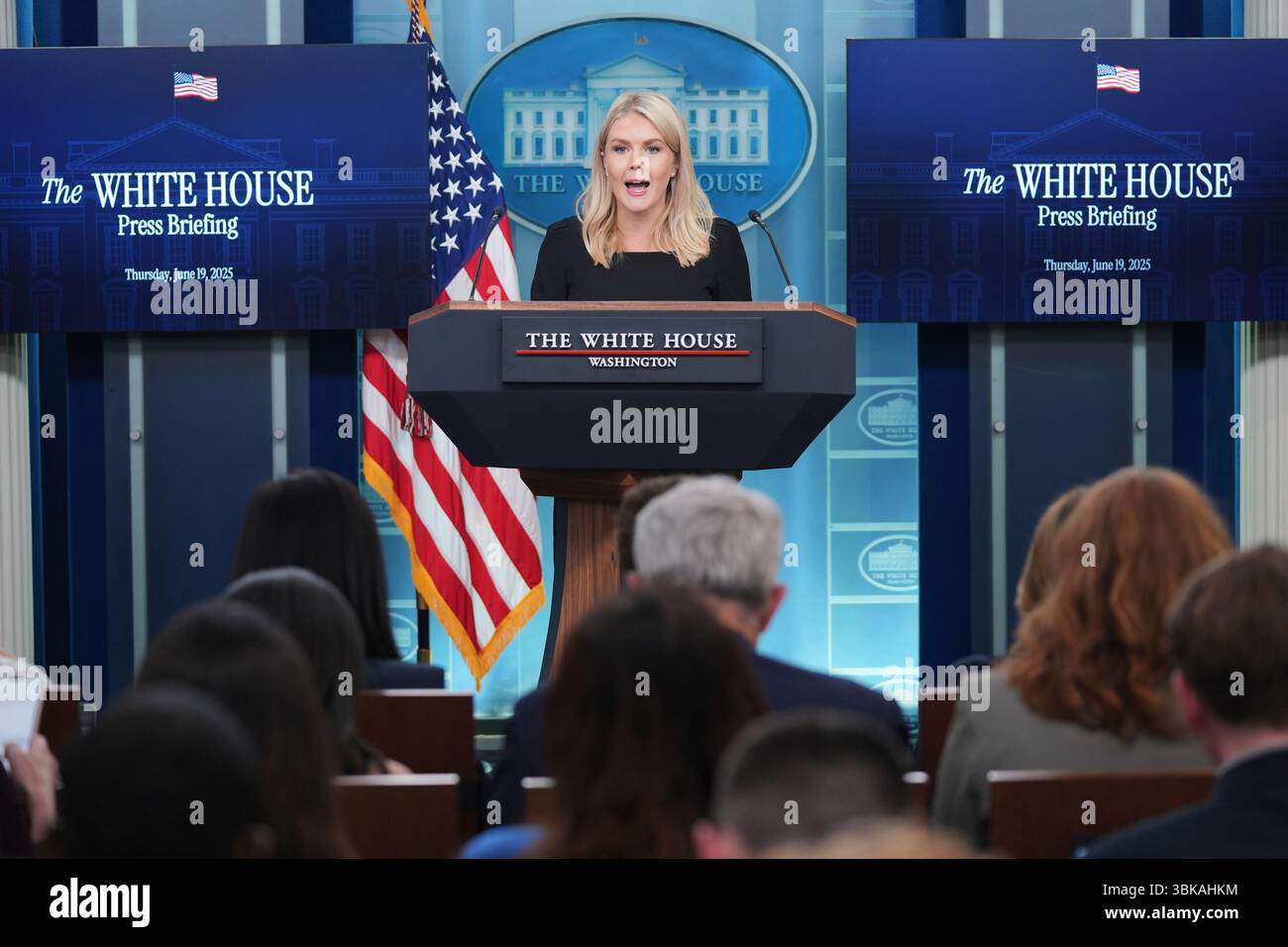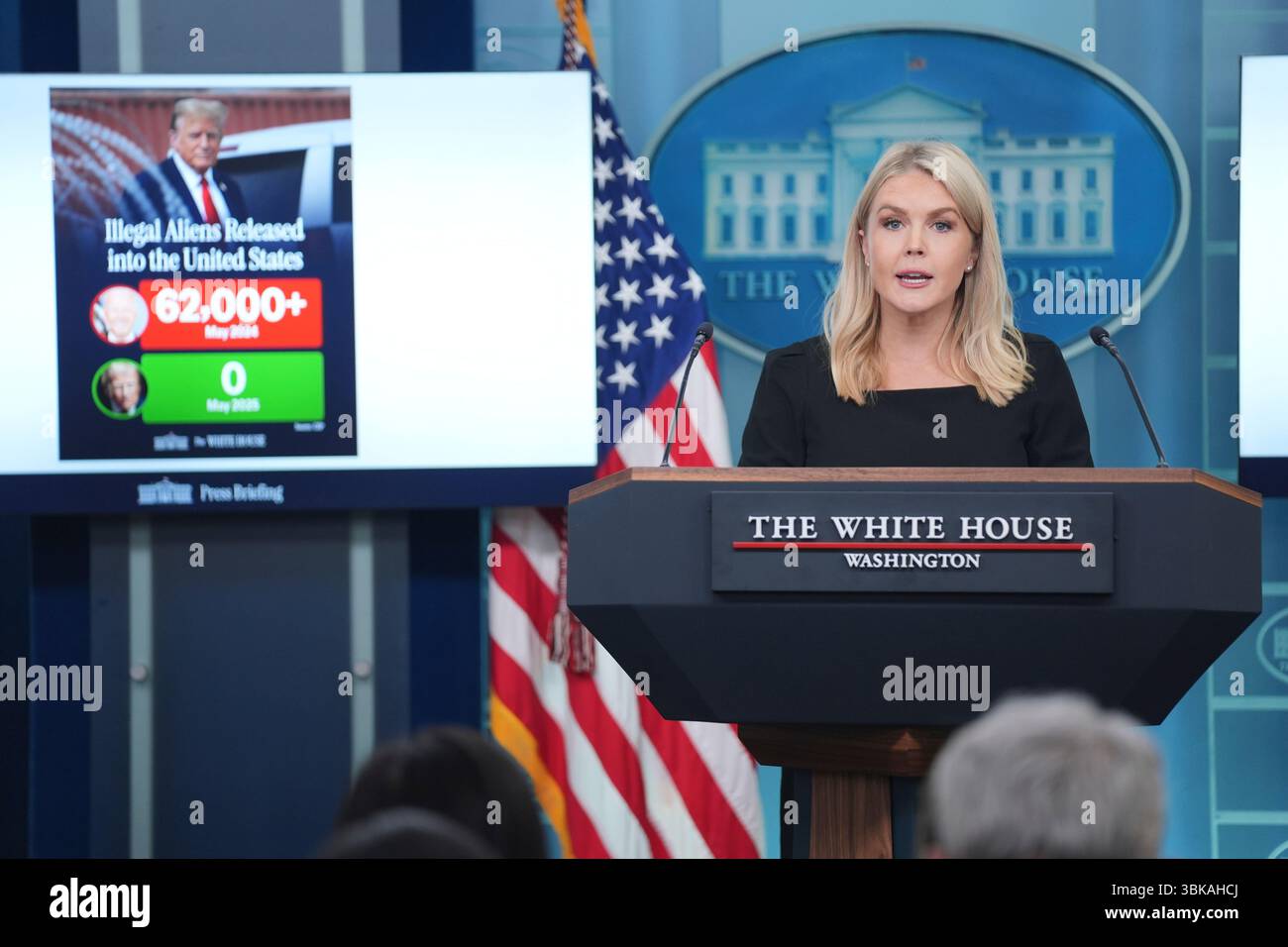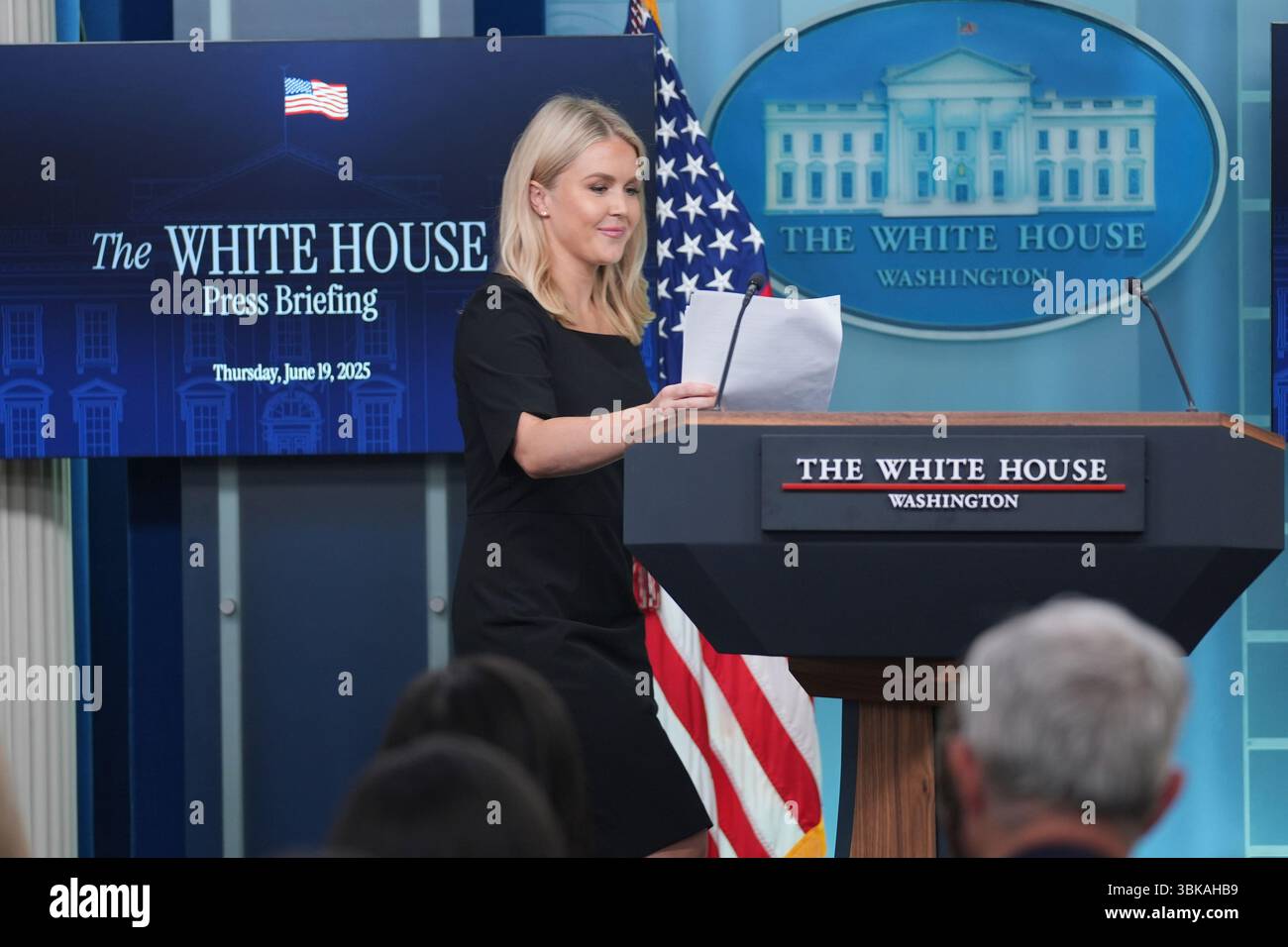Press Secretary Karoline Leavitt - A Look At News And Information
It's really something, isn't it, how we get our news and the various ways information comes our way? We often think about the big stories, the important happenings that shape our days, but there's a whole system behind getting that news to us. You know, it's a pretty big deal, this idea of staying informed, and a lot of different groups work hard to make sure we have access to what's going on around us.
So, when we talk about news, we're thinking about places like the Associated Press, which has been around for a very, very long time, since 1846 actually. They're all about giving us facts, plain and simple, without any extra stuff added in. It's kind of neat to consider how a group like that, with such a long history, still works to provide fast, accurate, and fair news today, making sure we get the straight scoop on things, more or less.
And it's not just the big, international news services; there are also local sources, like the Press Democrat, which helps folks in places like Sonoma, Napa, Mendocino, and Lake counties keep up with their sports, entertainment, and what's happening nearby. Plus, you've got companies offering all sorts of products through mail and the internet, like those listed in a book with over 500 businesses, or the Eden Press website with its collection of books and reports. It's a pretty wide range of ways we get information and goods, isn't it?
Table of Contents
- Who is Press Secretary Karoline Leavitt?
- How Do News Organizations Keep Us Informed?
- What Kinds of Products Are Offered by Mail and Internet?
- How Do We Understand "Press" in Different Ways?
Who is Press Secretary Karoline Leavitt?
When we talk about specific individuals like a press secretary, it's pretty typical to want to know a bit about their background and what they do. However, based on the information we have right here, there isn't any direct mention of a person named Karoline Leavitt or details about her life. The text we're working with focuses more on news organizations and various kinds of products, so we can't really tell you much about her personal story from this particular set of words, you know? It's just not in the source material we've been given to work with, which is something we have to keep in mind, of course.
Personal Details
As we just mentioned, the materials provided don't offer any personal information about Karoline Leavitt, such as her birth date, where she grew up, or her educational background. So, we can't fill out a table with those sorts of details. It's just not something that's included in the text we're drawing from, which is kind of how it goes sometimes when you're working with specific information. We're sticking to what's literally on the page, so to speak.
| Category | Information |
| Full Name | Information not available from provided text. |
| Date of Birth | Information not available from provided text. |
| Place of Birth | Information not available from provided text. |
| Education | Information not available from provided text. |
| Career Highlights | Information not available from provided text. |
How Do News Organizations Keep Us Informed?
It's a very interesting question, how all this information reaches us, isn't it? We rely so much on news groups to give us the scoop on what's happening, both close to home and far away. These groups have a big job, making sure what they share is accurate and gets to us quickly. It's pretty much their main purpose, you know, to be a reliable source for the public. They play a very important part in our daily lives, actually, helping us stay connected to the wider world and our own communities, which is something to think about.
The Role of the Associated Press and Press Secretary Karoline Leavitt
The Associated Press, or AP, is a pretty big name in the news business. It's been around for ages, since 1846, which is quite a long stretch of time. Their main aim is to give us factual reports, just the straight goods, without any spin. They're known for being a very trusted place to get news that's fast, correct, and fair. So, when you hear about something happening, there's a good chance the AP had a hand in getting that information out there first. It's a system that's been working for a long, long time, and they just keep at it, providing what they call unbiased news. While the text mentions the AP's role, it doesn't actually connect this to a specific person like press secretary Karoline Leavitt, so we're talking generally about how these news gathering groups operate, more or less.
They have a job that involves gathering stories from all over the globe, then making sure those stories are presented in a way that people can trust. This means a lot of checking facts and getting things right before they share them with the public. It's a constant effort to keep up with events as they unfold, and then to present them clearly. You can imagine the amount of coordination that goes into something like that, making sure that what's reported is what actually happened. It's a pretty significant undertaking, frankly, and they've been doing it consistently for well over a century, which is quite a feat, in a way.
Local Coverage with the Press Democrat and Press Secretary Karoline Leavitt
Moving from the big, global news to something closer to home, we have places like the Press Democrat. This paper is a source for news, sports, and entertainment specifically for areas like Sonoma, Napa, Mendocino, and Lake counties. It's a different kind of news coverage, focusing on what matters to people living in those specific spots. You know, it's about the local teams, the community events, and the stories that impact neighbors directly. It's a pretty important role for a local paper to play, connecting people to their immediate surroundings. The text highlights its role as a local news provider, but it doesn't, however, link this to press secretary Karoline Leavitt. It's about how local news serves its community, which is a very different kind of focus compared to a national or international news service, but just as vital, you could say.
Local news sources like this often act as a central point for a community, letting people know about things that might not make the national headlines but are very important for daily life. They cover things like local government decisions, school events, and even just what's happening at the town fair. It's that kind of detailed, specific information that helps people feel connected to where they live. So, while the Associated Press covers the wide world, the Press Democrat helps us understand our own corner of it. It's a good example of how different news organizations serve different needs, actually, all contributing to a more informed public, which is pretty cool.
What Kinds of Products Are Offered by Mail and Internet?
It's pretty clear that our shopping habits have changed a lot over the years, haven't they? Back in the day, people would get catalogs in the mail, full of all sorts of things you could order. Now, a lot of that has moved online, to websites where you can browse and buy from anywhere. It's a very different experience, but the idea of getting products delivered right to your door is still pretty appealing. The text talks about a couple of examples of this, showing just how many different items you can find without even leaving your house, which is pretty convenient, really.
Finding ID Products and Press Secretary Karoline Leavitt
The text mentions a book that lists over 500 companies, all of them offering various kinds of "id products" by mail and over the internet. Now, what exactly "id products" are isn't spelled out, but it suggests a wide range of items, doesn't it? It could be anything from identity-related items to just general goods. The fact that there's a whole book dedicated to listing these companies tells you that there's a big market for things people can order from home. It shows how many businesses are set up to sell things this way, making it easier for folks to get what they need without going to a physical store. This section, of course, is about products and does not relate to press secretary Karoline Leavitt; it's just about the sheer volume of things available for purchase remotely, which is a pretty common thing these days, you know?
It's interesting to think about how this kind of commerce works, with so many companies sending out their goods. The text also mentions that "Times are tough, we know," and that some businesses are "proud to offer" solutions, which suggests a focus on value or meeting needs during challenging periods. This highlights how companies adapt to economic situations, trying to provide goods or services that people will find useful or affordable. So, whether it's through a catalog or an online store, the aim is to connect buyers with what they're looking for, even when things are a bit difficult financially. It's a very practical side of business, in a way.
The Eden Press Collection and Press Secretary Karoline Leavitt
Then we have the Eden Press website, which offers its "complete line of products," including more than 500 books and reports. This is another example of how you can get specialized items through mail or online. Five hundred books and reports is quite a collection, isn't it? It suggests a focus on information or particular topics, rather than just general merchandise. This kind of offering caters to people looking for specific knowledge or detailed writings. It's a good way for a publisher to reach a wide audience, making their entire catalog accessible without the need for a physical bookstore. The text is pretty clear about the volume of materials available, but it doesn't connect this to press secretary Karoline Leavitt. It's just another way information and specific products are distributed, showcasing the variety of things you can find through these channels, which is pretty cool.
The idea of having so many books and reports available from one source means that people can really dig into subjects that interest them. It's like having a specialized library at your fingertips, where you can order exactly what you need. This is a very different model from, say, a general department store, focusing instead on a particular type of content. It really shows how businesses can specialize and still reach a lot of people, thanks to mail and internet ordering. So, whether you're looking for general goods or very specific written materials, there's a system in place to get them to you, which is pretty helpful, you know.
How Do We Understand "Press" in Different Ways?
The word "press" is pretty interesting because it can mean so many different things, can't it? We use it in conversations all the time, but depending on how we use it, it can have a completely different meaning. It's one of those words that really shows how flexible our language is. From talking about news organizations to the simple act of pushing something, the word "press" covers a lot of ground. It's kind of neat to think about how one word can have such varied uses, actually, and it just goes to show how context matters so much when we're trying to figure out what someone means, right?
The Physical Act of Pressing and Press Secretary Karoline Leavitt
One way we use the word "press" is to describe a physical action, like pushing something. The text gives a couple of good examples of this. It talks about "To move by weight or force in a certain direction or into a certain position," which is pretty much the definition of pressing. Then it gives a picture: "The crowd pressed him into a corner." You can really imagine that, can't you? A group of people pushing someone, making them move where they don't want to go. It's a very vivid image of force and movement. This kind of "press" is all about physical contact and applying force. The text also mentions "To compress or squeeze, as to alter in shape or size," and gives the example, "He pressed the clay into a ball." This is another way of pressing, where you change the shape of something by squeezing it. So, these examples show the word "press" as a physical action, which is a pretty common use of the word. This physical meaning of "press" is what the text focuses on here, and it doesn't relate to press secretary Karoline Leavitt in any way, of course; it's just about the word itself, and how it describes actions.
It's pretty straightforward, this idea of applying pressure. When you press something, you're usually trying to make it move, or change its form, or get it into a specific spot. Think about pushing a button, or flattening something out. These are all instances of pressing. It's a very basic action, but it's one we perform or see performed all the time. The examples given really help to illustrate this, showing how a crowd can push someone, or how a person can mold something soft like clay. It's about direct, physical interaction with an object or another person, in a way, which is a very fundamental concept.
The Idea of Pressure and Press Secretary Karoline Leavitt
Building on the idea of physical pressing, there's also the broader concept of "pressure." When you "press" something, you're putting pressure on it. This can be a literal, physical force, like when the crowd pressed someone into a corner. But the idea of pressure can also be used in other ways, like when we talk about being under pressure to meet a deadline, or feeling the pressure of public opinion. While the text primarily sticks to the physical examples, these physical acts of pressing are the foundation for the broader idea of pressure. It's about a force being applied, whether that force is a group of people, or a hand on clay, or even something less tangible like expectations. The text does not, however, connect this to press secretary Karoline Leavitt, but it gives us a good look at how the word "press" can be understood in terms of exerting force or influence, which is pretty interesting when you think about it.
It's kind of like how a printing press works, too, in a way. It presses ink onto paper, creating something new. That's a very old use of the word "press," and it's where we get the term "the press" for news organizations. So, there's a connection there between the physical act of pressing and the idea of producing information. Even when we talk about a "privacy catalog" and needing to "call us at 1" if you want a print copy, that catalog itself was made by a printing press, which involves pressing. So, the word "press" ties into many different parts of how we get and use information, from the news we read to the books we might order. It's a pretty versatile word, isn't it?

White House press secretary Karoline Leavitt speaks during a press

White House press secretary Karoline Leavitt speaks during a press

White House press secretary Karoline Leavitt arrives to speak during a